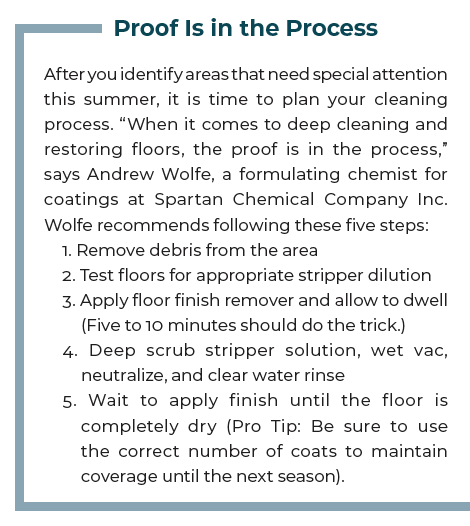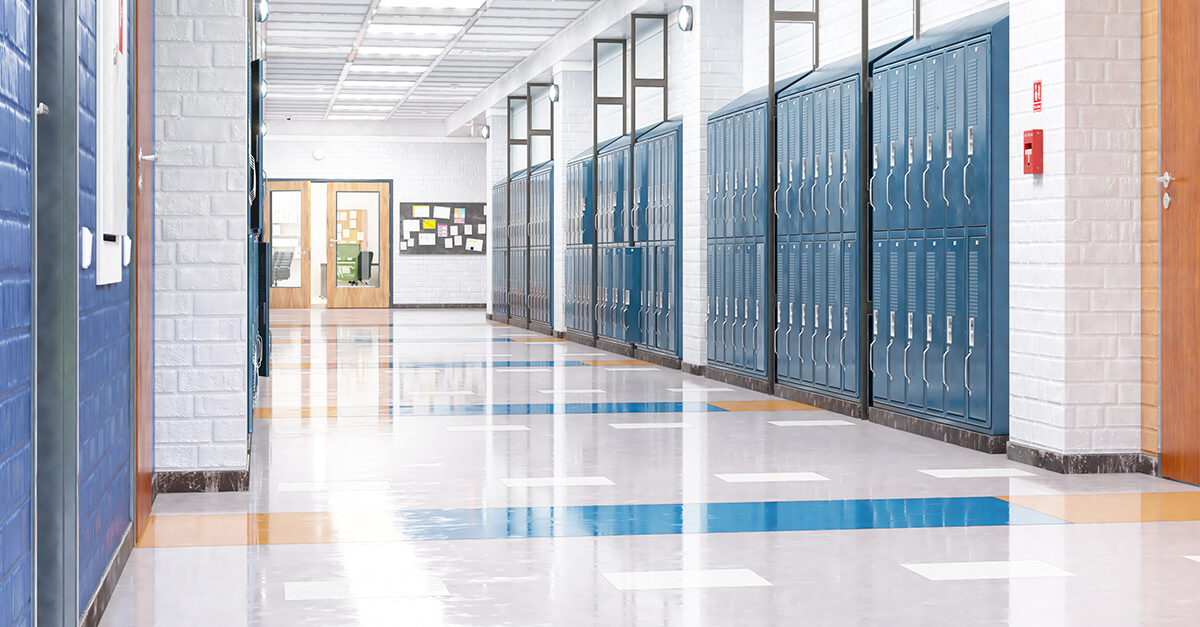Caring for hard floors at K-12 schools should be an ongoing process throughout the academic year. But summer break is the best opportunity for cleaning crews to focus on more time-consuming projects like deep cleaning and restoring high-traffic gymnasium and classroom floors. Service providers offer practical advice and tips in this article to help you make the most out of your time and labor this summer while the halls are quiet and foot traffic is minimal.
Take these summer prep steps
Before the real work gets started, you’ll need to plan and prepare. Dariusz Malachowski, unit director at SSC Services for Education, says proper planning and communication are the most important ingredients in a successful summer floor cleanup. “The preparation starts months before. It is a two-and-a-half-month-long project and needs to be treated as such,” he says.
Here are the steps Malachowski and other floor care experts take and recommend in the months leading to summer:
Evaluate the condition of all floor surfaces—A thorough evaluation will help you decide which type of restoration is necessary. Prioritize areas that need a full strip and recoat versus top scrub and recoat. “This allows me to determine how much product I will need to order and gives me a rough idea of the time allotment for each building or area,” Malachowski says.
Select your cleaning chemicals—Selecting cleaning products can be overwhelming, but just remember that one size does not fit all and more is not always better, says Andrew Wolfe, a formulating chemist for coatings at Spartan Chemical Company Inc. “Choose the cleaner and finish that works best for your facility,” he says. “Do you need a rapid repair? Something that requires low maintenance? Or something that is environmentally preferred? Also take into account the correct concentration of each chemical, as over-diluting or under-diluting your floor finish remover can cause problems such as tacky, gummy residue, or simply not getting the finish off the floor.”
Order supplies—Most facility managers will need to order more or different products and tools for summer floor refinishing compared to what they use during the school year. Malachowski uses large quantities of floor finish, finishing pads, and stripping pads. Ordering supplies early ensures his distribution center has them in stock and will ship products to him on time. “The worst thing that can happen is having your crew show up for work and not having tools or supplies for them to work with,” he says.
When ordering supplies, don’t forget safety equipment. “Be sure to have chemical-resistant footwear, personal protective equipment (PPE) such as gloves and goggles, as well as ‘wet floor’ signage,” Wolfe says. “Most importantly, this is a messy process, so make sure to protect yourself with a coverall.”
Inspect and repair equipment used for summer cleanup—Some floor machines have likely been sitting in storage for months and you’ll need to ensure they are in good working condition. Having spare parts for most critical pieces of equipment so that you can make repairs when a breakdown happens in the middle of the summer is a lifesaver, Malachowski says. “You need to have a stock of squeegee blades, gaskets, and filters for your wet vacs and auto scrubbers. A spare vacuum motor can save two weeks of idle time.”
Inquire about planned summer school activities—Find out when summer schools, camps, athletic practices, construction, or IT and maintenance projects will occur and plan your projects accordingly. It is critical to go into summer work planning with as much information as possible, Malachowski advises. “You do not want to have summer camp kids run into your school on Monday morning while you have your crew stripping floors because nobody thought of notifying you. This is a true story from my past summer cleanup,” he warns.
Make a detailed plan for daily and weekly accomplishments—This plan needs to consider all the information you have gathered about summer school activities. Share this plan with all the stakeholders. Give them a timeline to review and approve it. “You’d be surprised how often they will add things they forgot about initially,” Malachowski says.

Start your summer off right
Once the schedule is set and signed off on, it’s time to get your projects started. By this point, you’ll want to make sure all supplies and equipment are delivered and ready for your crew on day one of summer cleanup.
Malachowski likes to start his summer with a day of training. “Refreshing even seasoned associates in proper workflow and technique will benefit you all summer,” he says.
Wolfe agrees. “Trained workers are safer, more efficient, and get better results,” he says. “Check with your chemical manufacturer or distributor to access training tools and resources to get your staff up to speed on the proper processes and procedures required to get the job done safely and efficiently.”
Malachowski also places the summer work checklist outside every room to ensure the crew keeps track of what they complete throughout the summer. “In August, you will not remember if you have done all that is needed in the area because you worked on it in June,” he says.
Creating a floorplan with the furniture layout is important too since often you will need to move all the furniture and equipment out of a room to refinish the floors. Use the floorplan to set the furniture back as it was when the job is finished.
Tackle these big summer projects
All school floor surfaces are important and should get some attention during the summer break, says David Anderson, regional director of operations at SSC Services for Education. “Summer is the time to get into everything, and I mean everything. Common areas, classrooms, restroom floors, gyms, libraries, principals’ offices….and the list goes on.”
You’ll be in good shape starting off if you have performed regular floor maintenance including spot mopping, dust mopping and auto scrubbing throughout the school year. Summer is the time to tackle a full strip and recoat in high-traffic areas and top scrub and recoat in more moderate-traffic areas.
Major projects on your list, like restoring gym floors and hallways, require days and perhaps weeks to finish. They are also the most challenging since these areas are the hardest to close off to foot traffic for extended periods. Communication, caution tape, and signs can help keep summer students and staff from cutting across your work area, Malachowski says, but they aren’t a guarantee.
When it comes to hardwood floors, Anderson says it is essential to work with every stakeholder in early spring to secure dates for placing these areas out of service. “This can be tricky because most junior high and senior high schools remain busy all year, and the refinishing process can take up to a week per floor,” he says. However, proper communication with school planners will work wonders, leading them to be flexible such as moving summer camp activities outdoors during the floor refinishing process.
Once the area is cleared, Anderson’s teams clean the floor thoroughly with a mopping procedure and special equipment, then use a screening process that takes off a few layers of the polyurethane that lays on top of the wood floors. Then they begin the process of tacking the floor.
“That is a fancy way of saying that we use mineral spirits, towels, and large dust mops to trap and remove the very fine dust produced during the screening process,” Anderson says. “You do not want any dust residue on the floor during the final process of applying the new coats of floor finish—typically polyurethane, which is a petroleum-based product. The drying or curing time can be a week or more.”
Vinyl composition tile (VCT) floors must be periodically stripped and rewaxed throughout the school year to ensure a safe surface, but some will need more extensive work once school is out.
Jodie M. Ricks, president of Intuitive Cleaning Solutions (ICS), says when her crews initially wax a floor, they give it at least seven coats/layers of wax so they will only need to scrub and recoat rooms throughout the school year, and touch up only a few rooms during the summer break.
“This eliminates the need to empty entire rooms of furniture each year,” Ricks say. “It also allows for schools to save on their bottom line, and only have to strip and wax rooms with complete furniture removal every four to five years.”
Meet summer’s unique challenges
When long drying times and unexpected school activities threaten to disrupt the summer cleanup routine, you could use a water-based finish, which reduces the drying time to only a day or two. However, for most high-traffic areas, Anderson stresses the importance of using durable, long-lasting petroleum-based products to help reduce labor costs and keep your customers satisfied with long-term quality.
Never assume that schools will be empty, and that you will be able to perform the work according to your established plan. “Always have Plan B in mind for each day,” Malachowski says. “If your crew shows up for work and there are painters painting walls, you should know ahead of time where you will shift your resources instead.” Anderson agrees. “It should be the responsibility of the floor experts to adjust to and work around the very busy and vital activities at each campus, not the other way around.”
Wrap up with these final steps
As the summer comes to an end, Malachowski recommends doing as much burnishing as you can manage. Burnishing freshly refinished floors helps cure the finish and makes them less prone to scratching and scuffing.
Don’t forget to pull up tape, remove equipment from the site, and clean surrounding areas. Carefully reset furniture to the diagram you made earlier in the summer. Inspect to ensure all job details are completed and create a punch list of remaining issues to correct. Lastly, Anderson recommends taking your school stakeholders/clients on a final walkthrough inspection once the job is complete.
Reap your rewards
Beyond contributing to a safe and clean school environment for students and teachers, you may find your summer floor cleanup yields a few additional rewards for your team.
“Despite all of the challenges associated with completing the project on time, I believe summertime in the school setting is a very rewarding time,” Malachowski says.
He finds a great way to boost morale is to take several before-and-after photos of the floors to show his team what a difference their hard work made.
“When school starts, I see more team spirit and cohesion among those who worked in the summer together. My teams work hard but smile and joke a lot too,” he says.



